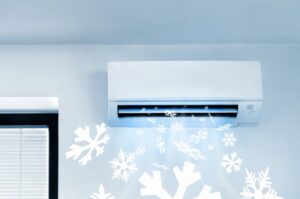Variable refrigerant flow (VRF) systems are increasing in popularity in commercial properties thanks to their high energy efficiency, zoning capabilities, flexibility, scalability, space-saving design, and more. But even the most advanced in newer commercial HVAC technologies can still malfunction, and we want to ensure that you know the signs of trouble with your VRF system. That way you can promptly call our technicians for AC repair in Chicago.
Inconsistent Temperature Control
Inconsistent temperature control is often one of the first signs that a VRF system is malfunctioning. If different areas within the same building experience fluctuating temperatures, it might indicate problems with the system’s zoning capabilities, sensors, or control settings.
Unusual Noises
Unusual noises, such as grinding, squealing, or banging sounds, coming from a VRF system can signal mechanical problems. These noises may be due to loose or damaged components, such as fans or compressors. Persistent unusual sounds should be investigated promptly to prevent further damage to the system and to maintain comfort within the building.
Poor Airflow
Poor airflow can be a symptom of several potential issues within a VRF system. Blockages in the air ducts, dirty filters, or malfunctioning fans can restrict the airflow, leading to inadequate cooling or heating. Regular maintenance and inspection of the system’s components can help identify and rectify these problems.
Unexplained Increase in Energy Bills
An unexplained increase in energy bills may indicate that the VRF system is not operating efficiently. This can be caused by refrigerant leaks, malfunctioning compressors, or clogged filters, which force the system to work harder to maintain the desired temperature. Regular energy consumption monitoring and system maintenance can help identify and resolve these inefficiencies.
System Short-Cycling
Short-cycling occurs when the VRF system turns on and off frequently without completing a full cooling or heating cycle. This can be caused by oversized equipment, thermostat issues, or refrigerant problems. Short-cycling not only leads to increased wear and tear on the system but also reduces its efficiency and comfort levels.
Refrigerant Leaks
Refrigerant leaks are a common issue in VRF systems that can severely affect their performance. Leaks reduce the amount of refrigerant available to absorb and release heat, leading to poor cooling or heating. Signs of refrigerant leaks include hissing noises, decreased cooling efficiency, and ice formation on the evaporator coils. Professional repair is necessary to locate and fix the leaks and recharge the system with refrigerant.
Excessive Humidity
Excessive humidity within a building can be a sign that the VRF system is not effectively removing moisture from the air. This could be due to an undersized system, malfunctioning components, or incorrect settings. High humidity levels can lead to discomfort and promote the growth of mold and mildew, so it’s essential to address this issue promptly.
System Not Responding to Controls
If the VRF system does not respond to thermostat adjustments or control inputs, it may indicate problems with the control board, sensors, or communication between system components. This lack of responsiveness can lead to inefficient operation and discomfort. Troubleshooting the control system and ensuring proper communication can resolve these issues.
Electrical Issues
Electrical issues, such as tripped breakers, blown fuses, or flickering lights, can signify problems within the VRF system’s electrical components. Faulty wiring, overloaded circuits, or failing capacitors can cause these issues. Addressing electrical problems promptly is crucial to prevent system failures and ensure safe operation. Regular inspection by a qualified technician can help identify and fix electrical issues before they escalate.
Althoff Industries, Inc. offers full commercial HVAC service to Chicagoland. Challenges Accepted!

